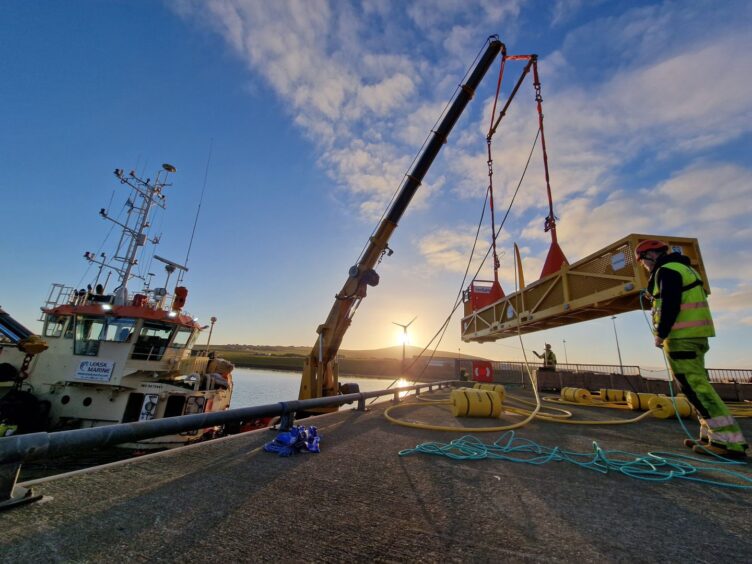
A groundbreaking project combining wave power and subsea energy storage has completed its year-long trial off Orkney, and will return to base later this spring.
The £2 million demonstrator project, dubbed Renewables for Subsea Power (RSP), kicked off in February last year with the deployment of a Mocean Energy Blue X wave device alongside a Halo underwater battery system developed by Aberdeen firm Verlume.
Hailed by backers as a “tremendous success”, RSP’s initial four-month test run was extended to one year, with numerous new partners joining the scheme over the course of 2023.
Its final phase is now about to commence, which will see all equipment removed from the site ahead of inspection and clean down onshore in Orkney and at Verlume’s operations facility in Dyce, Aberdeen.
The industry-backed project, located 5km east of Orkney Mainland, has shown how green technologies can be combined to provide reliable and continuous low-carbon power and communications for subsea equipment. The partners say the systems could offer an integrated alternative to subsea umbilical cables.
Tests were also run last summer using a resident autonomous underwater vehicle (AUV) provided by Transmark Subsea.
Over the past year the project has garnered international attention, with energy major TotalEnergies and a division of Shell Technology signing on to the pan-industry initiative, alongside the like sof the Thai national oil company PTTEP, Serica Energy, Harbour Energy, Baker Hughes and the Net Zero Technology Centre (NZTC).
“The test programme has been a tremendous success,” said Verlume chief commercial officer Andy Martin.
“This phase of RSP was initially conceived as a four-month at-sea demonstration, but the quality of data and the robustness of our combined technologies as well as tremendous support from the oil majors, led us to extend the programme to a full year. We now have increasing confidence in the reliability and the commercial potential of this system.”
Ian Crossland, commercial director at Mocean, added: “In the subsequent months, all the technology providers will examine critical components for wear and tear against performance metrics defined both individually and as a fully integrated power and communications ecosystem.
“A key part of this process will be assessing lessons learned and any future upgrades that may be required for a fully commercial system.”
More projects could follow
Trial participants and developers are now evaluating near-term and future plans for further deployments of the technology including “possible testing on live assets”
This could see further similar projects deployed in Scottish waters, and/or new trials launched overseas.
Richard Knox, CEO of Verlume, last month told Energy Voice he hopes that the Halo and RSP system could become the “default” for parts of the offshore energy sector where it will be most critical, removing the need for tens – or even hundreds – of kilometres of cables.
Recommended for you
